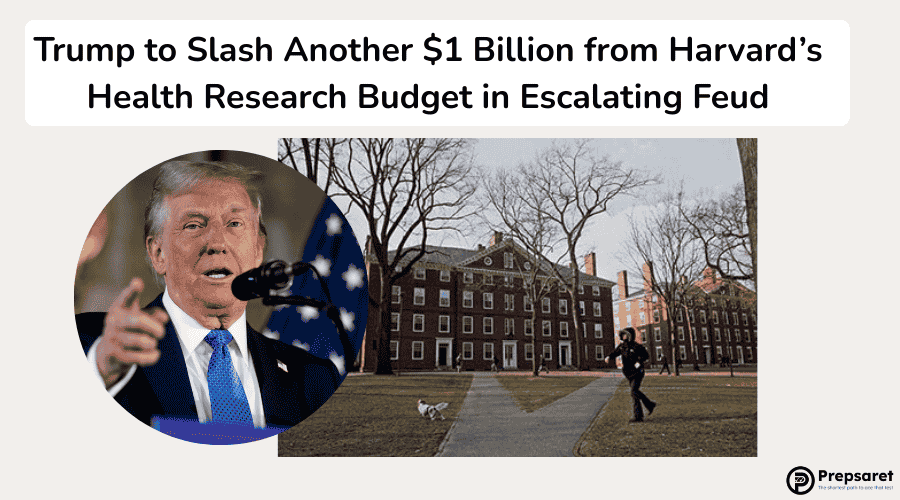Key Takeaways:
- The Trump administration plans to cut an additional $1 billion in health research funding to Harvard, adding to a $2.2 billion freeze already in effect.
- The move follows Harvard’s public rejection of federal demands related to antisemitism, student discipline, and curriculum control.
- The administration claims the university breached a confidential negotiation process by releasing the letter publicly.
- Harvard maintains that the demands threaten its constitutional and academic independence.
- Massachusetts Governor Maura Healey and the Anti-Defamation League have criticized the administration’s actions as overreach.
The conflict between the Trump administration and Harvard University has intensified, with President Donald Trump now planning to cut an additional $1 billion in health research funding.
This move follows the administration’s earlier decision to freeze $2.2 billion in multi-year federal grants, prompted by what it described as Harvard’s failure to curb antisemitism on campus during pro-Palestinian protests.
Federal Demands and Harvard’s Rejection
Tensions escalated after Harvard publicly released a letter dated April 11 from the federal Task Force to Combat Anti-Semitism, which included demands that the university reform admissions and hiring processes, ban protest masks, report foreign students who violate policies, and reduce the influence of faculty accused of political activism.
Harvard’s president, Alan M. Garber, responded firmly, stating, “The University will not surrender its independence or relinquish its constitutional rights.”
In rejecting the administration’s demands, Garber emphasized that most proposals represented unconstitutional government intervention in the university’s internal affairs rather than genuine efforts to address antisemitism.
The administration had originally issued a set of preliminary demands on April 3. These were followed by the April 11 letter, which was later described by The New York Times as having been sent in error, though the White House confirmed its authenticity and said it “stands by the letter.”
Fallout and Political Reactions
According to The Wall Street Journal, federal officials had expected Harvard to treat the letter as a confidential negotiation document and were surprised by its public release. The administration reportedly viewed the disclosure as a breach of trust and a provocation, prompting the additional $1 billion funding cut.
Officials had initially intended to be more lenient toward Harvard than Columbia University, which complied with similar demands, but reversed course following the publication of the letter.
Critics have voiced concern about the administration’s approach. Anti-Defamation League CEO Jonathan Greenblatt wrote in the Times of Israel that “combating antisemitism on campus should be addressed on its own process and merits,” warning against using it as a vehicle for broader political agendas.
Massachusetts Governor Maura Healey, a Harvard alumna, called the move to revoke the university’s nonprofit status “outrageous,” accusing Trump of trying to silence academic institutions.
Broader Implications for Higher Education
The standoff has become a broader symbol of resistance by higher education institutions against federal oversight. Harvard is the first major university to fully reject the administration’s policy demands, drawing both political and legal scrutiny.
Republican lawmakers in Congress have initiated an investigation into Harvard’s conduct, alleging violations of civil rights law.
The impact extends beyond Harvard. According to an Associated Press analysis, over 1,000 international students across 160 institutions have had their visas revoked or status terminated since late March, signaling a growing federal crackdown on campus activism.
As the battle between academic freedom and federal authority deepens, Harvard’s defiance has set a precedent that could shape the future relationship between U.S. universities and the federal government.
Also in the news:

